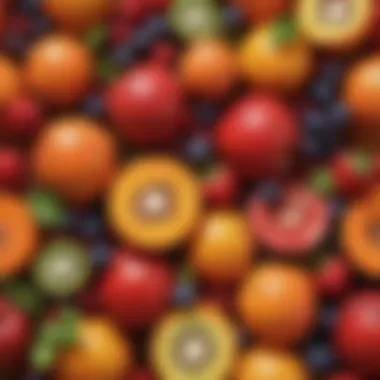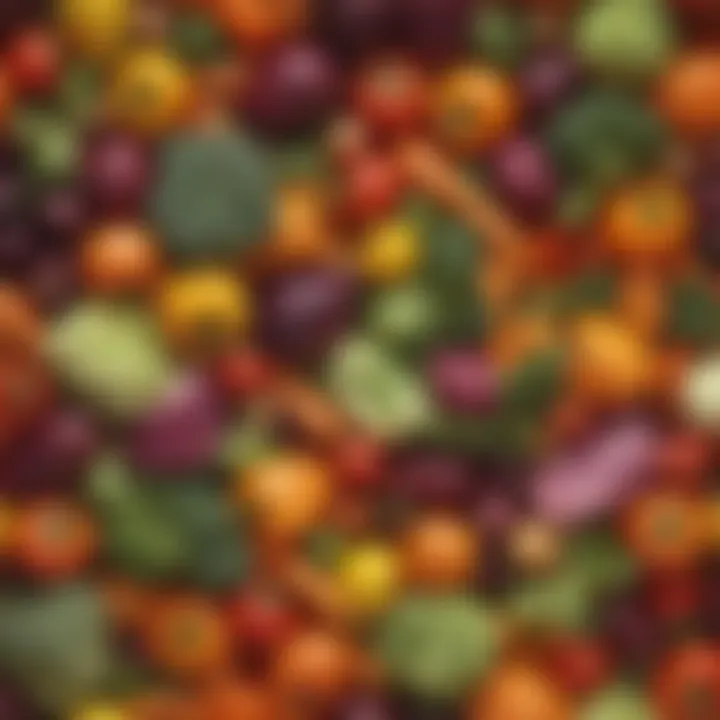Nourishing Youth: Foods for a Youthful Appearance


Intro
The quest for youthful skin is an age-old pursuit, transcending cultures and generations. Many people find themselves seeking the secrets behind maintaining a vibrant appearance, eager to fend off the signs of aging. Nutrition plays a pivotal role in shaping both our skin and overall well-being. This article puts a spotlight on the nutrients that not only satiate hunger but also nourish the skin from the inside out. While a myriad of creams and treatments flood the market, it’s time to return to the basics – what’s on our plates.
The idea is simple yet profound: the body is a reflection of what we consume. Each meal offers an opportunity to impart life-giving nutrients that can combat the aging process. Let’s explore foods that are touted for their potential to rejuvenate, providing the body with essential vitamins, minerals, and antioxidants that promote not just longevity but a radiant complexion.
In the subsequent sections, we will delve into specific food groups that play crucial roles in skin health and vitality. You might find yourself surprised at how some everyday ingredients possess remarkable anti-aging properties and can transform the way you look and feel from the inside out.
Prelude to Nutrition and Aging
When discussing the intricate relationship between nutrition and the aging process, one must recognize how vital our choices surrounding food are in shaping our overall health and appearance. With each passing year, our bodies naturally undergo a series of transformations—some subtle and some more pronounced. As we age, our skin can lose its luster, and vitality may diminish, often prompting individuals to seek ways to combat these changes.
Understanding this relationship opens a window into not just our dietary habits, but the very biological mechanisms that dictate how we age. For instance, specific nutrients act like keepers of youth, providing the necessary building blocks to maintain skin elasticity and vitality. It's not just about eating well; it’s about eating right.
The Benefits of Nutrition on the Aging Process
Nutrition is our first line of defense against the visible effects of aging. By consuming a balanced diet rich in essential vitamins, minerals, and antioxidants, we can foster healthier skin and a more vibrant appearance. Key elements include:
- Antioxidants: These are crucial in combating free radicals that can accelerate the aging process. Foods abundant in antioxidants, such as berries and green leafy vegetables, help neutralize these harmful molecules.
- Healthy Fats: Not all fats are created equal. Healthy fats, like those found in avocados and nuts, promote skin hydration and improve texture.
- Hydration: Water is essential, not only for our overall health, but also for maintaining supple skin.
From the moment we take our first bites of food to the meals that comprise our daily rituals, each choice impacts our body's functioning and resilience against aging. Incorporating a wide variety of fresh foods can yield numerous benefits, such as improved skin texture, increased elasticity, and a reduction in signs of aging.
Considerations on Products and Diets
As enticing as trendy diets may sound, it’s essential to be cautious about highly restrictive plans that can deprive our bodies of necessary nutrients. Quality over quantity should always be the maxim, focusing on whole foods rather than processed options. A balanced diet that promotes youthfulness should emphasize:
- Whole grains instead of refined carbs.
- Lean proteins, such as fish and legumes, over processed meats.
- A rainbow of fruits and vegetables that deliver a spectrum of nutrients.
Understanding the Aging Process
Aging is an inevitable part of life, but knowing how it unfolds can help us take charge of our health and appearance. The aging process is not merely about getting older; it involves complex changes within our bodies that can affect our skin, energy levels, and overall vitality. Understanding these changes allows us to make informed dietary choices that may slow down aging and keep us looking and feeling youthful.
Biological Mechanisms of Aging
As we age, our cells undergo a series of transformations. One major player in this process is oxidative stress, largely caused by free radicals. Think of free radicals as the ne'er-do-wells of the cellular world; they can harm cells and even lead to premature aging. However, our bodies have a defense system in place, primarily antioxidants, that can neutralize these unwelcome guests.
Another significant aspect is telomere shortening, which happens every time our cells divide. Telomeres are protective caps at the ends of our chromosomes. Over time, as these caps get shorter, it can lead to decreased cellular function and, ultimately, aging. So, when we consume foods rich in antioxidants like blueberries or vitamin C, we might be helping to protect our telomeres and maintain cellular integrity.
Moreover, the aging process is also fueled by inflammation. Chronic inflammation is no friend to youthful skin and can lead to a raft of health issues. Factors such as poor diet, lack of exercise, and stress can elevate inflammation levels. Adopting anti-inflammatory foods like turmeric and fatty fish can make a real difference.
Impact of Lifestyle on Aging
What we do every day adds layers to our aging experience. Lifestyle choices play a crucial role across various aspects. For instance, physical activity is linked to increased longevity and enhanced skin appearance. Exercise boosts circulation, ensuring that nutrients are delivered to the skin cells more effectively and that toxins are removed efficiently.
- Diet Matters: The foods we choose have a domino effect on how we age. A diet high in processed foods can exacerbate oxidative stress and inflammation. On the flip side, whole foods that are rich in vitamins, minerals, and other nutrients can keep our cells healthier longer.
- Sleep Quality: The role of sleep shouldn’t be underestimated. Lack of restful sleep can lead to an increase in stress hormones, which can affect both physical appearance and overall health. During sleep, our bodies enter a repair phase, allowing for critical functions such as cellular repair and growth to take place.
- Stress Management: Chronic stress can age us faster, both mentally and physically. It can lead to habits like overeating or neglecting physical health, which further exacerbates aging. Incorporating practices such as mindfulness or yoga can be beneficial.
"It’s not just the years in your life that count. It’s the life in your years."
Adopting a well-rounded approach that emphasizes balanced eating, regular exercise, quality sleep, and effective stress management can significantly counteract the aging process.
The Role of Diet in Maintaining Youthfulness
When it comes to preserving the vigor of youth, what you eat plays a significant, though sometimes overlooked, role. Meticulously choosing foods loaded with beneficial nutrients can create an internal environment that supports skin health, boosts energy levels, and enhances overall vitality. A balanced diet doesn’t simply stave off age-related ailments; it actively promotes a youthful appearance. By nourishing the body from the inside out, one can effectively counteract some aging symptoms.
Understanding the connections between diet and the aging process can be empowering. It opens doors to proactive approaches that benefit both skin and mood. For instance, specific vitamins, minerals, and macronutrients have been shown to maintain collagen production and cell regeneration. Additionally, certain food choices can contribute to inflammatory responses, affecting how young we look and feel. Taking heed of these insights allows for the potential to reclaim a fresher, more youthful visage.
Nutrients Essential for Skin Health
Skin, being the largest organ, demands a variety of nutrients to maintain its integrity and resilience. Here’s a closer look at some essential ones:
- Vitamin C: This vitamin is crucial for collagen synthesis, helping skin stay taut and supple. Found in abundance in citrus fruits, bell peppers, and strawberries, it acts as a powerful agent against aging.
- Vitamin E: Known for its antioxidative properties, Vitamin E shields skin cells from oxidative stress and UV damage. Nuts, seeds, and leafy greens are great sources.
- Zinc: This mineral is vital for skin repair and function. It promotes the healing of wounds and can enhance skin barrier function. Enjoy foods like beans, chickpeas, and pumpkin seeds to bolster zinc intake.
- Omega-3 Fatty Acids: Oils rich in Omega-3, such as those from fatty fish, can help keep skin moisturized and reduce inflammation, which can lead to premature aging.
These nutrients serve more than just aesthetic purposes; they also support overall health. The skin acts as a mirror reflecting our internal state. When one is well-fed with appropriate nutrients, not only do the skin benefits manifest, but they also echo in energy and mood.
Antioxidants and Their Functions
Antioxidants are the unsung heroes in the quest against aging. They neutralize free radicals—unstable molecules that can damage cells and lead to signs of aging like wrinkles, discoloration, and loss of elasticity. Incorporating a variety of antioxidant-rich foods is essential to help combat this oxidative stress.


Consider these powerful antioxidants:
- Flavonoids: Found in a multitude of fruits, vegetables, and beverages like tea, flavonoids have anti-inflammatory and antioxidant properties, improving circulation and thus helping skin tone and texture.
- Carotenoids: Present in colorful produce such as carrots, sweet potatoes, and apricots, carotenoids can enhance skin tone and increase protection against UV rays.
- Polyphenols: These are prevalent in dark chocolate, berries, and red wine. Polyphenols have been shown to support skin elasticity and hydration.
Utilizing a basket full of these antioxidant-laden foods can help to not only boost the skin’s resilience but also promote an overall vitality that comes with a youthful spirit.
"Let food be thy medicine and medicine be thy food." — Hippocrates
Thus, a well-rounded diet rich in these nutrients can serve as a robust defense against the wear and tear of time, reinforcing the notion that eating well is a fundamental part of maintaining youthfulness.
Foods Rich in Antioxidants
Antioxidants play a crucial role in maintaining our youthfulness by combating oxidative stress that can accelerate the aging process. These substances help protect our cells from damage caused by free radicals—unstable molecules that can wreak havoc on our bodies, contributing to skin aging and various health issues.
Incorporating foods high in antioxidants into our diet can lead to numerous benefits, including improved skin health, enhanced immune function, and even better mood regulation. It's essential to understand not just what these antioxidant-rich foods are, but also how they work to promote a more youthful appearance.
Foods rich in antioxidants are not just a passing fad; they are vital elements of a balanced diet. Including a variety of these foods can fortify your body against the ravages of time, helping to preserve that youthful glow.
Berries and Their Benefits
Berries are among the top sources of antioxidants, particularly flavonoids, which are known for their anti-inflammatory properties. When you munch on blueberries, raspberries, or strawberries, you’re gifting your body powerful phytonutrients that may help reduce signs of aging by improving collagen production and skin hydration. You might want to whip up a smoothie or toss them into your morning oatmeal. Not only do they offer a delightful burst of flavor, but they also contribute to a radiant complexion.
Adding these little gems to your diet can be a game changer. These fruits are low in calories yet high in goodness. For example, consuming just a cup of strawberries provides over a quarter of your daily vitamin C needs, crucial for collagen synthesis, effectively warding off sagging skin.
Dark Leafy Greens
When it comes to foods that promote a younger look, dark leafy greens like kale, spinach, and Swiss chard shouldn't be overlooked. These greens are not only low in calories but are packed with antioxidants, vitamins, and minerals that work synergistically to support skin health. Notably, these greens are rich in vitamin K, which is pivotal in maintaining skin tone and reducing the appearance of dark circles under your eyes.
Incorporating these greens into your meals can be easy. Think of a hearty salad loaded with olive oil, a sprinkle of lemon, and some seeds, or perhaps a simple sauté to accompany your main course. The possibilities are endless, and the benefits of these greens are far-reaching.
Nuts and Seeds
Nuts and seeds, such as walnuts, almonds, chia seeds, and flaxseeds, serve as an excellent source of antioxidants while also providing healthy fats that nourish the skin. Particularly, walnuts are notable for their high content of omega-3 fatty acids, which help maintain skin elasticity and hydration. Chia seeds, on the other hand, are vibrant little powerhouse packed with not just omega-3s but also fiber and protein—ideal for smoothies or sprinkled onto a salad.
Integrating these into your diet can be straightforward. You might sprinkle them on your breakfast cereal, toss them into a salad, or enjoy a handful as a snack. They are like nature’s candy, yet so much better for your skin and overall health.
Healthy Fats and Their Impact
Healthy fats play a crucial role in achieving and maintaining a youthful appearance. The body requires fats not just for energy but also for absorbing essential nutrients and maintaining skin health. While some fats can lead to myriad health issues, the right types of fats offer numerous benefits. Incorporating healthy fat into your diet can bolster cellular health, combat inflammation, and enhance skin elasticity. Despite some misconceptions, fats are an integral layer of a nourishing diet, promoting both internal and external vitality.
Omega-3 Fatty Acids
Omega-3 fatty acids are a standout among healthy fats. These polyunsaturated fats are renowned for their anti-inflammatory properties, which contribute to healthier skin and a more radiant appearance. Research has suggested that these fats maintain skin hydration and elasticity, warding off those telltale signs of aging, such as wrinkles and dryness.
Sources of Omega-3s include:
- Fatty fish like salmon and mackerel
- Walnuts
- Chia seeds
- Flaxseeds
Including these foods in your diet can make a significant difference in skin health. The omega-3s found in these sources work wonders by optimizing cellular function and promoting a natural glow from within.
“Low omega-3 intake is linked to dry skin and multiple aging effects.”
Avocado and Olive Oil
Avocado and olive oil are two more golden examples of healthy fats that benefit your skin. Avocado is rich in monounsaturated fats, which not only nourish skin but also improve elasticity. This creamy fruit is also packed with vitamins E and C, both pivotal for skin repair and protection against environmental damage. Its unique nutrient profile helps to combat oxidative stress, which is a primary contributor to premature aging.
On the other hand, olive oil is often hailed as a staple in the Mediterranean diet for good reason. It is loaded with oleic acid and antioxidants, helping to preserve skin vitality and elasticity. When used as a dressing, a cooking fat, or even as a skincare remedy, it helps to lock in moisture, making skin appear plumper and more youthful.
Tips to Incorporate Avocado and Olive Oil:
- Add slices of avocado to salads or sandwiches.
- Use olive oil as a base for dressings or for sautéing vegetables.
- Blend avocado into smoothies for a creamy texture.
Combining healthy fats in your diet is not only palatable but also a wise strategy in your journey toward a youthful appearance.
Importance of Hydration
Hydration is often overlooked when it comes to maintaining a youthful appearance. However, the role of water in our bodies is more than just quenching thirst. It’s crucial for various bodily functions that directly affect skin health and overall vitality. When we’re well-hydrated, our skin appears plump and radiant rather than dry and dull. This section dives into why staying hydrated is essential for looking youthful.


Water is a fundamental component of our body, accounting for roughly 60% of our total weight. Every cell depends on water for basic functions, including transporting nutrients and flushing out toxins. Without adequate hydration, the skin can lose its elasticity, leading to premature aging signs such as wrinkles and fine lines. Moreover, dehydrated skin is more prone to flakiness and irritation, leaving it looking lackluster.
Benefits of Staying Hydrated:
- Maintains Skin Elasticity: Water helps retain moisture in the skin, ensuring it stays supple.
- Flushes Toxins: Proper hydration aids the kidneys in flushing out waste, promoting clear skin.
- Enhanced Circulation: Good hydration supports better blood circulation, which can mean a healthy glow.
- Overall Vitality: Staying hydrated contributes to improved energy levels and can help fight fatigue.
"Hydration is not just about drinking water; it's about making sure your body functions optimally."
Water and Its Role in Skin Elasticity
Water plays a pivotal role in skin elasticity by maintaining the skin's moisture balance. Elasticity is the skin’s ability to stretch and return to its original shape. As we age, our skin naturally loses collagen and elastin, two proteins that help keep our skin firm and pliable. A lack of sufficient moisture accelerates this process.
When the skin is well-hydrated, it can absorb nutrients more efficiently, which are crucial for the production of collagen and elastin. As a result, drinking an adequate amount of water daily, typically around 8 cups, can significantly enhance skin elasticity. However, many people find it challenging to drink enough water throughout the day. Simple reminders, like keeping a water bottle close or adding slices of fruits and herbs to make it more appealing, can make all the difference.
Hydrating Foods
In addition to drinking water, incorporating hydrating foods into your diet can elevate your hydration levels. Many fruits and vegetables have high water content and are brimming with vitamins and antioxidants that benefit the skin.
Here are some of the most hydrating options to consider:
- Cucumbers: Comprising about 96% water, cucumbers can help keep your skin hydrated and fresh.
- Watermelon: This summer favorite is made up of roughly 92% water and also delivers vitamins A and C.
- Oranges: Not only do they provide hydration, but they are rich in vitamin C, which is vital for collagen production.
- Strawberries: These berries are another great option, containing about 91% water.
- Leafy Greens: Spinach and kale not only offer water but also essential nutrients that promote skin health.
By making these hydrating foods a regular part of your meals, you can ensure that your body is getting both hydration and nutrition, contributing to a youthful, vibrant appearance.
Incorporating Fermented Foods
Fermented foods have made a comeback in recent years, drawing attention for their multitude of health benefits. They're not just trendy; they’re a great addition to your diet if you’re looking to maintain that youthful glow. Fermentation, the process where microorganisms like bacteria and yeast convert sugars into acids or alcohol, enhances the nutritional value of food. This process not only preserves the foods but also makes nutrients more bioavailable, meaning your body can absorb them more efficiently. It’s essential to recognize the role these foods can play in supporting skin health, digestion, and even immune function, all of which contribute towards a vibrant appearance as we age.
Probiotics are at the forefront of this discussion—those beneficial bacteria that, when consumed, provide a plethora of health benefits. They help restore the natural balance of gut flora, which can directly impact how your skin looks. A healthy gut often leads to improved skin conditions and a brighter, more even complexion.
Moreover, the incorporation of fermented foods can have a ripple effect on overall wellness. By nurturing gut health, you pave the way for better digestion, which enhances nutrient absorption and ultimately influences not just your physical health but also your appearance.
Benefits of Probiotics on Skin Health
When we think of beauty, we often think of creams and serums, but the secret might just lie within our gut. Probiotics, particularly the strains found in fermented foods, contribute significantly to skin health. Here’s how:
- Improved Skin Barrier Function: Probiotics have been shown to strengthen the skin's barrier, helping to retain moisture better and protecting against irritants. A robust barrier means less dry and flaky skin.
- Reduction in Inflammation: Many skin conditions, like acne and eczema, are linked to inflammation. Probiotics can help reduce this inflammation, resulting in clearer skin and fewer breakouts.
- Balancing Oil Production: Some studies indicate that probiotics can help balance the production of oil, reducing acne and giving your skin a more youthful appearance.
- Boosting Hydration: Fermented foods can enhance hydration because of their hydrating properties. Well-hydrated skin is less prone to wrinkles.
A research study published in the journal "Dermatology" suggests a notable link between probiotics and improvements in skin conditions, supporting the idea that gut health very much relates to skin vitality. Thus, including fermented options in your diet can indeed be a game changer for your skin.
Popular Fermented Options
Integrating fermented foods into your daily meals can be easier than you think. Here’s a list of some popular fermented foods that not only bring flavor but also pack a nutritional punch:
- Yogurt: A well-known source of probiotics. Opt for plain, unsweetened varieties to avoid added sugars.
- Kefir: Similar to yogurt but drinkable; it's rich in probiotics and can be mixed with fruits or smoothies.
- Sauerkraut: Fermented cabbage that is not only great for gut health but also adds a crunch to salads or meals.
- Kimchi: This spicy Korean dish made from fermented vegetables is delicious and loaded with probiotics.
- Miso: A savory paste used in Japanese cooking, often added to soups, enriching them with gut-friendly goodness.
- Kombucha: A fizzy drink made from fermented tea, it provides both probiotics and antioxidants, making it a great choice for hydration.
Incorporating these foods into your diet is a delicious way to amp up your health and appearance, making it easy to nourish both body and skin. The synergy between gut health and skin vitality highlights how interconnected our body systems truly are. Making small changes can lead to big results, reflecting in your skin's glow and overall health.
Remember: Nutrition isn't about perfection but about balance. Enjoy the process of exploring new foods for a healthier, more youthful you.
Spices and Their Youth-Promoting Properties
Spices are often viewed as mere flavor enhancers in the culinary world, but they hold a treasure trove of health benefits, particularly when it comes to maintaining a youthful appearance. These vibrant ingredients are packed with essential nutrients, antioxidants, and anti-inflammatory compounds that contribute to skin health and overall vitality. Incorporating spices into your diet isn’t just about adding zest; it’s about feeding your body substances that can promote radiant skin and enhance your well-being.
Understanding the role spices play in health can give you that edge in life. They can aid as both preventive measures and active support in the aging process. Besides flavoring your dishes, spices like curcumin and ginger have scientific backing that illustrates their myriad benefits. From reducing oxidative stress to seeping inflammation, they act behind the scenes to help users embrace their inner youth and manifest that glow.
"The path to longevity can often be found in the kitchen, where spices flourish alongside nutritious foods."
Curcumin and Its Benefits
Curcumin, the active compound found in turmeric, is often hailed as a super-spice for its potent anti-inflammatory and antioxidant properties. The golden hue of turmeric is not merely aesthetic; it signifies a wealth of benefits for those keen on preserving their youth. Studies indicate that curcumin can help combat age-related skin issues like wrinkles, dullness, and hyperpigmentation.
Here's how curcumin works its magic:
- Anti-inflammatory: Curcumin inhibits various inflammatory pathways, which may reduce redness and swelling in the skin, making it appear smoother.
- Skin Elasticity: Regular consumption of curcumin may support the retention of skin elasticity, which naturally declines as we age.
- Protection Against UV Damage: Curcumin can shield skin cells from harmful UV rays, reducing chances of sun damage and skin cancers, which are often accelerated by oxidative stress.
Curcumin doesn’t just stop at beautifying the skin; it also offers internal benefits. It can help maintain cognitive health, heart health, and improved digestion, which collectively contributes to a more youthful, vibrant life.


Ginger as a Vital Ingredient
Ginger, a staple in both culinary and medicinal practices, packs a punch beyond piquing your taste buds. It is renowned for its ability to fight inflammation and stimulate circulation, which can enhance the complexion.
Ginger can play a crucial role in keeping skin looking fresh and youthful by:
- Boosting Circulation: Improved blood flow can result in healthier, more vibrant skin. Increased circulation carries oxygen and nutrients to skin cells, thus promoting a youthful glow.
- Reducing Inflammation: Due to its potential to modulate inflammatory responses, ginger can help alleviate conditions like acne and rosacea, keeping skin clearer and healthier.
- Antioxidant Properties: Ginger is brimming with gingerol, a potent antioxidant that helps ward off free radicals responsible for aging.
Moreover, the perks of ginger aren’t limited to the skin. It aids in digestion, a vital process that, when optimized, can lead to better nutrient absorption and an overall enhanced sense of vitality.
Foods to Avoid for a Younger Look
In the pursuit of maintaining a youthful appearance, the maxim that you are what you eat rings especially true. It’s not just about incorporating nourishing foods; equally crucial is knowing which items to sidestep. Many foods can accelerate the aging process, impair skin health, and ultimately alter how we perceive our vitality. Being mindful of what goes in our mouths can yield significant benefits not just for aesthetic purposes, but for overall well-being as well.
Processed Sugars and Their Effects
The sweet allure of processed sugars can be hard to resist, yet they come with a hefty price. Consuming high amounts of sugar can lead to rapid spikes in blood glucose levels, igniting a chain reaction of inflammatory responses in the body. This inflammation is not your friend in the battle against aging. It can break down collagen and elastin, two proteins instrumental for skin structure and elasticity.
- Glycation: This phenomenon occurs when sugars bind to proteins, forming harmful compounds called advanced glycation end products (AGEs). These AGEs are notorious for initiating oxidative damage, which can tarnish the skin's glow.
- Breakouts: A diet replete with sugar often promotes acne, leading to scarring and uneven textures, making the skin look older than its years.
- Energy Slumps: Sugar might give a quick energy boost, but it often results in crashes that affect mood, leading to stress—another aging factor.
Navigating away from processed sugars means swapping out sodas, candies, and other sticky sweets for natural sources of excitement, like fresh fruits. Rich in phytochemicals and natural sugars, fruits counteract inflammatory processes while promoting a youthful look.
Trans Fats and Inflammatory Foods
Trans fats are the proverbial villains in the pursuit of a flawless complexion. These artificial fats, often lurking in processed foods and snacks, can cause a heap of trouble in the body. They not only raise bad cholesterol (LDL) but simultaneously lower good cholesterol (HDL).
- Inflammation: As trans fats find their way into our bodies, they can worsen inflammation, manifesting in skin issues like redness, acne, and general dullness. With increased inflammation, the skin loses its firmness, leading to sagging and wrinkles.
- Heart Health: Beyond just skin, the consumption of trans fats threatens cardiovascular health, creating a vicious cycle where poor heart health can worsen overall vitality, including skin quality.
- Poor Dietary Choices: Foods high in trans fats, like fried foods, margarine, and many baked products, might seem tempting, but they often lack the nutritional oomph that whole foods provide.
Ending
Eliminating processed sugars and trans fats from the diet is a significant step towards preserving a youthful appearance. Simply put, the choices we make at the kitchen counter can either help us bloom into our best selves or send us retreating into aging shadows. Finding alternatives that are body-friendly promotes not just aesthetics but a lifestyle of health and longevity.
Holistic Approach to Youthfulness
A holistic approach to youthfulness encompasses far more than a few well-chosen foods; it intertwines diet, physical well-being, emotional health, and lifestyle choices into a comprehensive tapestry. Integrating these aspects can create a harmonious balance that enhances not only aesthetic appeal but also overall vitality. When it comes to keeping the signs of aging at bay, it’s about nurturing oneself from the inside out.
The Role of Sleep and Stress Management
Sleep is often called the best medicine, and for good reason. During those precious hours of rest, the body gets a chance to repair and rejuvenate itself. Deep restorative sleep promotes healthy cellular function, regulates hormones, and enhances skin texture. On the other hand, chronic stress can wreak havoc on one's health, leading to inflammation and premature aging.
To manage stress, consider adopting mindfulness techniques such as meditation or yoga. Regular practices can help center one’s thoughts and promote a sense of calm. You can also try deep breathing exercises to lower cortisol levels, giving you a clearer mind and a healthier appearance.
- **Prioritize good sleep:
- **Implement stress reduction strategies:
- Aim for 7-9 hours of quality sleep each night.
- Establish a calming bedtime routine to signal your body it's time to wind down.
- Keep electronics out of the bedroom to reduce distractions.**
- Explore hobbies like painting, gardening, or reading.
- Make time for physical activities like walking or cycling, which can serve as a natural mood booster.
- Connect with friends or family. A little catch-up can work wonders for your mental state.**
Regular Physical Activity
Being active is another crucial pillar of a youthful lifestyle. Exercise fosters circulation, bringing oxygen and nutrients to the skin's surface, which not only enhances radiance but can prevent sagging or dullness. Furthermore, regular movement supports muscle tone and bone density, which often decline with time.
Integrating a variety of activities—like cardio, strength training, and flexibility work—can provide a comprehensive workout that keeps your body agile and resilient:
- Cardio exercises: Running, swimming, or brisk walking can uplift your heart rate and therefore your spirits.
- Strength training: Using weights can help maintain muscle mass, offering more definition and vitality to your figure.
- Flexibility work: Practices like Pilates or yoga can improve balance and posture, making your body appear taller and more energized.
"Maintaining a youthful appearance is as much about how you feel
as how you look; embrace a holistic approach for true vitality."
In summary, a holistic approach to youthfulness acknowledges that every tiny aspect—be it nutrition, sleep, or exercise—plays a vital role in how you feel and how you appear. Such a commitment to overall wellness encourages not only a glowing exterior but also a healthier, more vibrant life.
End: The Path to Lasting Vitality
As we navigate through the journey of aging, the significance of nutrition becomes ever more glaring. The foods we consume play a pivotal role, not just in our overall health but distinctly in maintaining a youthful appearance. This article underscores that our diet can influence our skin's resilience, our vitality, and even how we perceive ourselves as we grow older.
A balanced nutrient-rich diet can lay down a strong foundation for robust skin health. Key elements like antioxidants, healthy fats, and hydration are champions in the game against aging. These don't just add years to our lives; they enrich the quality of those years. Incorporating berries, almonds, avocados, and leafy greens, for instance, can pave the way toward a youthful complexion and enduring energy.
"You are what you eat": a truth that rings especially loud in the context of aging.
Moreover, it's essential to embrace a holistic approach, intertwining nutritional choices with lifestyle factors. Sufficient sleep and stress management are equally crucial. Regular physical activity complements the goals set by nutritional discipline, forming a comprehensive strategy for lasting vitality.
Equipped with this knowledge, it becomes apparent that we hold the reins in our quest for youthfulness. Every meal is an opportunity to energize our bodies and enhance our aesthetic appeal.
When putting all these pieces together, remember this: aging is inevitable, but how we age is a matter of choices we make. A little effort in the kitchen can translate to benefits that radiate outward. Nourishing youth isn't just about preventing the visible signs of aging, but about cultivating an enhanced sense of well-being, embodying that inner vitality that reflects on the outside.
As we wrap up this exploration of foods beneficial for maintaining youthful looks, it is clear that the journey toward a vibrant, younger appearance is ongoing. Let's embrace this lifestyle change, equip ourselves with knowledge, and indulge in the power of good nutrition. It’s not just about looking younger; it’s about feeling better across all walks of life.







